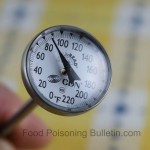Sunnyside Orchards apple cider is being recalled, and the Minnesota Department of Agriculture is issuing a consumer advisory because that product was apparently inadequately processed and stored at improper temperatures, which would allow the growth of potentially harmful bacteria. All cider produced since August 31, 2018 is affected by this recall and advisory. The cider was sold in gallon and half gallon containers. No reports of illness have been received to date in connection with this recall. The notice did not state which pathogens may be a risk for this type of product, but officials did say that if you have experienced vomiting or diarrhea after drinking it, to see your doctor. Officials do know of some locations that have sold this product, but this list is not complete. The … [Read more...]
Leftover Rice Could be as Dangerous as Raw Eggs
Did you know that foods other than raw eggs and raw meats present a food poisoning hazard? Cooked rice is one of those foods. The Food Standards Agency is warning consumers that reheated rice is a food safety hazard. Uncooked rice can contain bacterial spores. When the rice is cooked, the spores survive. When cooked rice stands at room temperature, the spores will become active and produce toxins. Those toxins may not be destroyed by heat, so when you eat the reheated rice, you will get sick. The longer rice is left at room temperature, the more likely the toxins will be produced. When you make rice, cool it within one hour after it finishes cooking. Divide the rice into smaller portions and place in shallow contains; refrigerate immediately. The cooked rice should be kept in the … [Read more...]
Thanksgiving Leftovers and Food Safety
The USDA is reminding consumers that turkey leftovers should be frozen after three or four days in the refrigerator. That means if you have any turkey left over from Thanksgiving dinner, it should be in the freezer by Monday. Correctly refrigerating all leftovers is critical to preventing foodborne illness. The bacteria in food left at room temperature for more than two hours double in number every 20 minutes. And some bacteria produce a toxin while they are growing that isn't destroyed by heat. Leaving food out at room temperature is one of the main causes of foodborne illness. It's also important to cool food rapidly to below 40 degrees F. Large amounts of food (such as the turkey) should be divided into smaller pieces and refrigerated as soon as possible. When you're storing other … [Read more...]
Food Safety Tips For Storing Leftovers
Ever wonder about those leftovers in your fridge? You're not alone. Because so many people have questions about the proper way to store leftovers, the U.S. Food and Drug Administration (FDA) has compiled some tips. One key tool for safe food storage is an appliance thermometer. These can be purchased at hardware or home improvement stores. Keep the refrigerator at 40 °F or below and the freezer at 0 °F or below. Before putting food into the fridge, make sure it is clean. Wash shelves and drawers, discard expired items. If you aren't sure about something, don't sniff it, just throw it out. Make cleaning out the fridge part of your kitchen cleaning routine. Always wipe up spills right away. Make sure you are not putting spoiled food into the fridge. This would include perishable … [Read more...]








